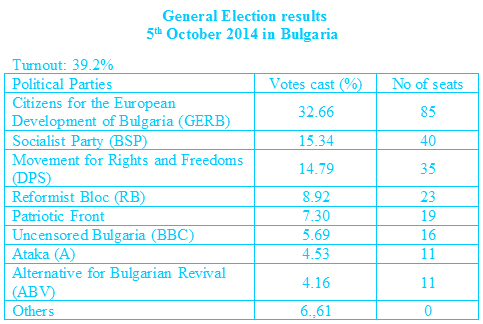Results
Elections in Europe
Corinne Deloy
-

Available versions :
EN
FR
Corinne Deloy
The Citizens for the European Development of Bulgaria (GERB), the main opposition party led by former Prime Minister (2009-2013) Boyko Borissov, came out ahead in the general elections that took place in Bulgaria on 5th October. This snap election followed the resignation of the government led by Plamen Oresharski in the wake of the withdrawal of the Movement for Rights and Freedoms (DPS) from the government coalition. The GERB won 32.66% of the vote and 85 of the 240 seats in the National Assembly (Narodno sabranie), the only chamber in Parliament, i.e. 12 less in comparison with the previous election on 12th May 2013.
The Socialist Party (BSP), led since 27th July 2014 by Mihail Mikov, followed with 15.34% of the vote but the number of its MPs has halved (40 seats i.e. 44 less than previously). Its spokesperson Atanas Merdjanov acknowledged that the BSP had suffered a "heavy defeat". In third place came the Movement for Rights and Freedoms, led by Lyutvi Mestan who represents the Turkish minority with 14.79%, 35 seat (one less).
Five other parties will be represented in the National Assembly. The Reformist Bloc (RB) - an alliance that brings together the Democrats for a Strong Bulgaria led by Radan Kanev, the Bulgarian Movement for the Citizens led by former European Commissioner (2007-2009) Meglena Kuneva, the Democratic Forces Union, the National Freedom and Dignity Party and the National Bulgarian Agrarian Party - which won 8.92% of the vote and 23 seats. The Patriotic Front won 7.3% of the vote and 19 seats; Uncensored Bulgaria (BBC) founded and led by former TV journalist Nikolay Barekov won 5.59% and 16 seats; Ataka, a far right party led by Volen Siderov won 4.53% and 11 seats (- 12) and finally Alternative for Bulgarian Revival (ABV) led by former President of the Republic (2002-2012) Georgi Parvanov, 4.16% and 11 MPs.
In all 8 parties will be present in parliament.
Turnout did not rise beyond 40% and was its lowest since the fall of communism in Bulgaria in 1989.
 Source : Bulgarian Electoral Commission
Source : Bulgarian Electoral Commissionhttp://results.cik.bg/pi2014/rezultati/index.html
"I don't see how a government can be formed in this configuration," declared the opposition leader Boyko Borissov when the results were first announced. "I want to govern (...) I am ready to do everything necessary to avoid the darkest scenario of deadlock in which Bulgaria has no government," he said. He called on the parties' leaders "not to make any declarations immediately but to seek a solution via consultation." "The useful way would be for parties which won a low score to do something in the name of stability," he stressed. "If we don't have a coalition there will be further elections, which is synonymous to failure for Bulgaria," he warned. Boyko Borissov repeated throughout the electoral campaign that the GERB would take part in no government coalition if it did not win the absolute majority of the vote on 5th October.
"The only solution would be a wide coalition with the GERB, the socialists and other small parties. A government like that would be formed around a clear programme for a specific period, for example until the next presidential election in October 2016 (...) Unpopular decisions must be taken. Public opinion will accept a government like this if it deems it capable of stabilising the situation. It is the only option, anything else will lead to chaos," stresses Vassil Tontshev, director of pollster Sova-Harris.
Boriana Dimitrova, Director of the pollster Alpha Research believes that "the problem is not so much the number of small parties but the lack of clear political direction on the left or the right of these artificially formed parties that are driven by corporatist interests. This is why it will be difficult to form a government." He adds, "the danger with weak majorities is that they can every easily be swept away and so it is difficult to undertake serious reform."
The formation of the next Bulgarian government might therefore prove long and difficult, whilst the country needs stability and confidence more than ever before.
Bulgaria is the poorest country in the EU (the GDP/capita is only 46% of the European average; the average salary is 425€ and the average retirement pension, 150€) It is also the most unstable country politically. Its main problem lies in the weakness of the rule of law and in the degree of corruption and organised crime. Seven years after its entry into the EU Sofia is still under Brussels' supervision due to the incomplete nature of this police and legal system reform.
"Whatever the result of the general elections Bulgaria will have to suffer another five to seven years of political instability," declared Antony Galabox, professor of sociology at the New Bulgarian University some days before the election. In view of the results many political analysts believe that the next government will not last beyond the next presidential election planned for October 2016.
On the same theme
To go further
Elections in Europe
Corinne Deloy
—
15 April 2025
Elections in Europe
Corinne Deloy
—
25 February 2025
Elections in Europe
Corinne Deloy
—
18 February 2025
Elections in Europe
Corinne Deloy
—
28 January 2025

The Letter
Schuman
European news of the week
Unique in its genre, with its 200,000 subscribers and its editions in 6 languages (French, English, German, Spanish, Polish and Ukrainian), it has brought to you, for 15 years, a summary of European news, more needed now than ever
Versions :



